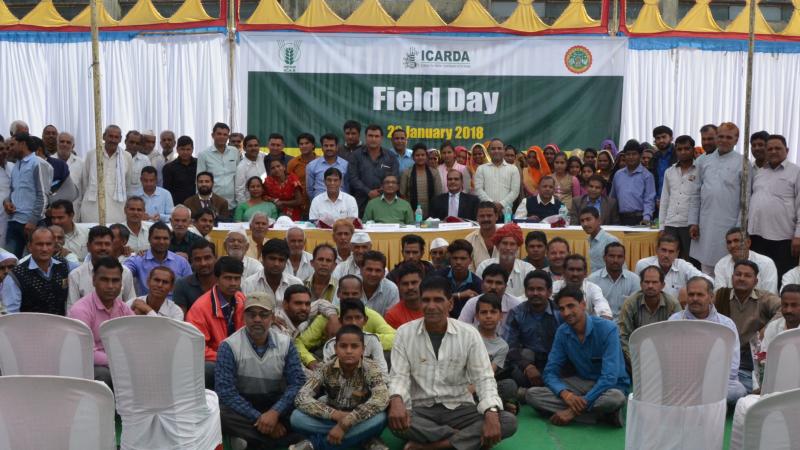ICARDA introduces improved pulse varieties to farmers

During a field day in its Amlaha Station in Central India’s Madhya Pradesh State, ICARDA shared its improved cultivars with 200 farmers and special guests. The government has recently launched an initiative to provide farmers with improved varieties and receive training on production technology in order to close the production gap.
Amlaha, India, January 29 – ICARDA India organized a field day in Amlaha, about 60 km east of Bhopal, the state capital of Madhya Pradesh in Central India. Amlaha station serves as the research platform for ICARDA’s food legume research. The objective was to help farmers learn about improved production technologies and varieties, and in turn to learn from farmers what their challenges are.
About 200 farmers, including 35 women farmers, from nearby Sehore and Shajapur districts attended the event. ICARDA is involved in scaling up of lentil technologies in eight districts in the state covering 900 hectares and more than 1,000 farmers. Special guests also attended the day-long event, including Mr. Prem Chand Meena from Madhya Pradesh state’s Farmers’ Welfare and Agriculture Development; Drs. I. S. Solanki and B. B. Singh from the Indian Council of Agricultural Research (ICAR); and Dr Archana Singh from the Indian Institute of Pulses Research (IIPR).
Last year, the Indian government made changes to its the Rashtriya Krishi Vikas Yojana (RKVY) scheme to focus more on value chain, post-harvest infrastructure, and agri-entrepreneur development in order to make farming more profitable. The RKVY scheme, launched in 2007, seeks to achieve 4% annual growth in the agricultural sector.
In the Madhya Pradesh, the government has launched an initiative to bridge yield gaps in lentil through technological intervention and capacity development. Through the initiative, farmers receive seeds of improved varieties to grow lentil in a cluster mode. They also receive training on provided production technologies, storage and processing. The initiative emphasizes women farmers’ role in increasing production.
During the event, the ICARDA team told farmers about the work it was doing on lentil, chickpea, grasspea, faba bean, wheat, barley and cactus, as well as its upscaling of lentil technologies. Farmers and the special guests had a chance to visit ICARDA’s technology exhibition park and seed production blocks. And farmers shared some of the challenges they face in crop production.
“The low-neurotoxin and high-biomass lines of grasspea ICARDA developed is excellent,” said Dr. Archana Singh on ICARDA’s effort to produce improved cultivars to make the hardy pulse viable. Despite its ability to withstand extreme heat and drought, grasspea hasn’t been encouraged as a cultivation crop in the region because its long-term consumption can be dangerous to human health. Farmers expressed great interest in receiving the improved varieties of grasspea and lentil, as well as chickpea, barley, wheat and cactus.
“It’s important that ICARDA continue to share such promising research results with Indian institutions,” Dr. Singh added.
